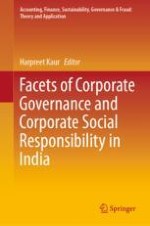2021 | OriginalPaper | Chapter
3. Mitigating White Collar Crimes: A Governance Reform Agenda
Authors : Rakesh Kumar Sehgal, R. L. Koul
Published in: Facets of Corporate Governance and Corporate Social Responsibility in India
Publisher: Springer Singapore
Activate our intelligent search to find suitable subject content or patents.
Select sections of text to find matching patents with Artificial Intelligence. powered by
Select sections of text to find additional relevant content using AI-assisted search. powered by
